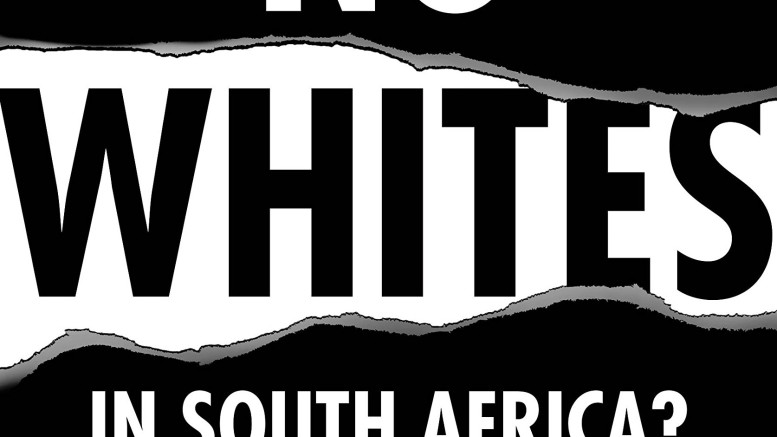In 2013 the BBC wrote a report asking: “Do white people have a future in South Africa?”
Now, in 2016, this question seems even more relevant.
Working-class white people, most of them Afrikaans-speakers, are going through an intense crisis. But you will not read about it in the newspapers or see it reported on television…

BBC World Affairs Editor John Simpson examines the challenges facing white South Africans.
The report generally takes a liberal ‘all whites are complicit in South Africa’s misery’ tack, and sandwiches various incontrovertible facts about whites in South Africa between such language.
With those bits excised, we get:
- The people who are suffering now are the weakest and most vulnerable members of the white community.
- Ernst Roets, a leading Afrikaans campaigner from the AfriForum organisation, took me to a squatter camp outside the country’s capital, Pretoria. A white squatter camp.
- It has been set up on the property of a sympathetic white farmer and is called, optimistically, Sonskyn Hoekie – Sunshine Corner.
- There are broken-down cars and bits of discarded furniture everywhere. Beyond the wooden shacks lie ditches and pools of dirty, stagnant water where mosquitoes breed. Two basic toilets serve the whole camp.
- According to Roets, there are 80 white squatter camps – many of them bigger than this – in the Pretoria area alone. Across South Africa as a whole, he believes there could be as many as 400,000 poor whites in conditions like these.
- Sonskyn Hoekie has no water and no electricity. The inhabitants live on two hand-out meals of maize porridge a day, which is provided by local volunteers. There is no social security for them, no lifeline…
- Semi-skilled white people have little chance of getting a job when so many black South Africans are unemployed.
In an article last year in FrontPage, Dan Greenfield writes:
Black Economic Empowerment (BEE) policies, the South African version of Affirmative Action, have closed job markets to white South Africans. Racial benchmarks have been incorporated into private industry and government service. As a result, Black South Africans with a higher education are 34% more likely to find a job than white South Africans with that same level of education. Andeven that education is becoming hard to come by as white students with excellent grades are being shut out of higher education and given few options besides a refugee camp or immigration to one of the few countries that will have them.
Towards the end of the BBC article, the writer acknowledges the post-apartheid genocide of whites in the country:
- There is another group of white Afrikaners, far higher up the social scale, who are deeply threatened – in this case, literally. Virtually every week the press here report the murders of white farmers, though you will not hear much about it in the media outside South Africa.
- In South Africa, you are twice as likely to be murdered if you are a white farmer than if you are a police officer – and the police here have a particularly dangerous life. The killings of farmers are often particularly brutal.
- Ernst Roets’s organisation has published the names of more than 2,000 people who have died over the last two decades. The government has so far been unwilling to make solving and preventing these murders a priority.
2,000 targeted, murdered whites (murdered at four times the rate of rural black South Africans) is a low-ball figure. To see the horrific nature of these attacks, see here[Warning: graphic photos].
Meanwhile, these persecuted white families, many of whose lineage in South Africa goes back to the 1600s, are regularly being denied political asylum in western countries. And what sorts of Western voices are chiming in on the issue?
- …Professor Mark Behr, of Rhodes College, in Memphis, Tennessee, and Dr Dennis Laumann, of the University of Memphis, have rejected requests that they help the family.
- “I am not interested in assisting Afrikaners claiming discrimination in a non-racial, democratic, post-apartheid South Africa,” wrote Laumann.
- “In my scholarly opinion, there is absolutely no basis for their allegation – whatever evidence they may present.”
- Behr – who is an award-winning South African author – said he did not believe the law firm would find “any fair-minded scholar” to support the family.
Maybe if on their immigration request forms, the white families said they were Muslim or non-white, they would improve their chances for successful asylum.
NOTE:Behr teaches courses in Fiction Writing, Post-Colonial Literature, Queer and Gender Theory, African Literature, Literature and War, and Contemporary World Literature.
One can safely guess what his politics are.
In the FrontPage piece, Dan Greenfield writes:
Dr. Stanton of Genocide Watch, a respected human rights organization, has stated that the white population of South Africa is now in the sixth of the center’s eight stages of genocide. That sixth stage is defined as “Preparation.”
“Victims are identified and separated out because of their ethnic or religious identity. Death lists are drawn up. Members of victim groups are forced to wear identifying symbols. Their property is expropriated. They are often segregated into ghettoes, deported into concentration camps, or confined to a famine-struck region and starved. At this stage, a Genocide Emergency must be declared.”
The next stage after “Preparation” is “Extermination”.

